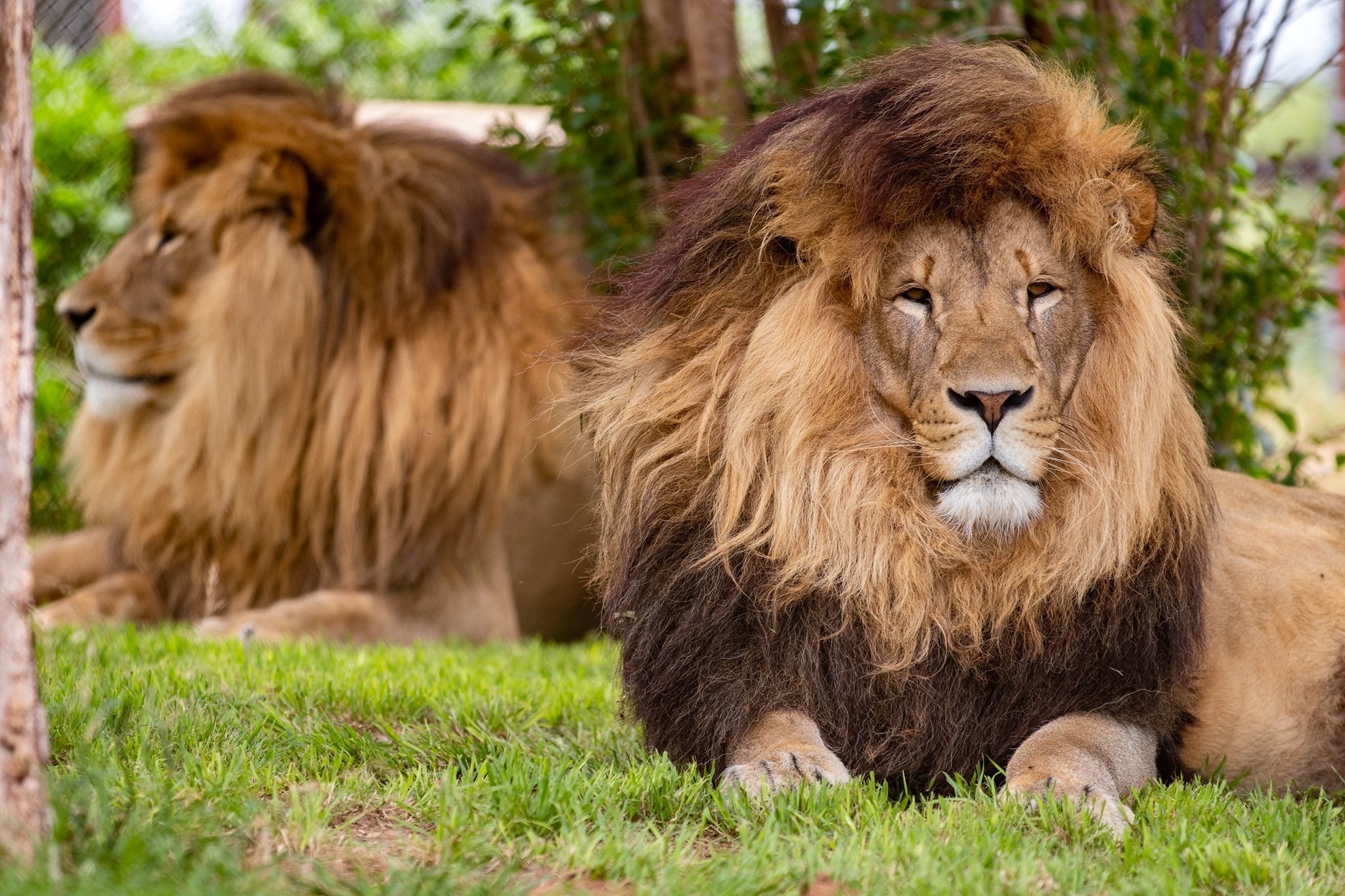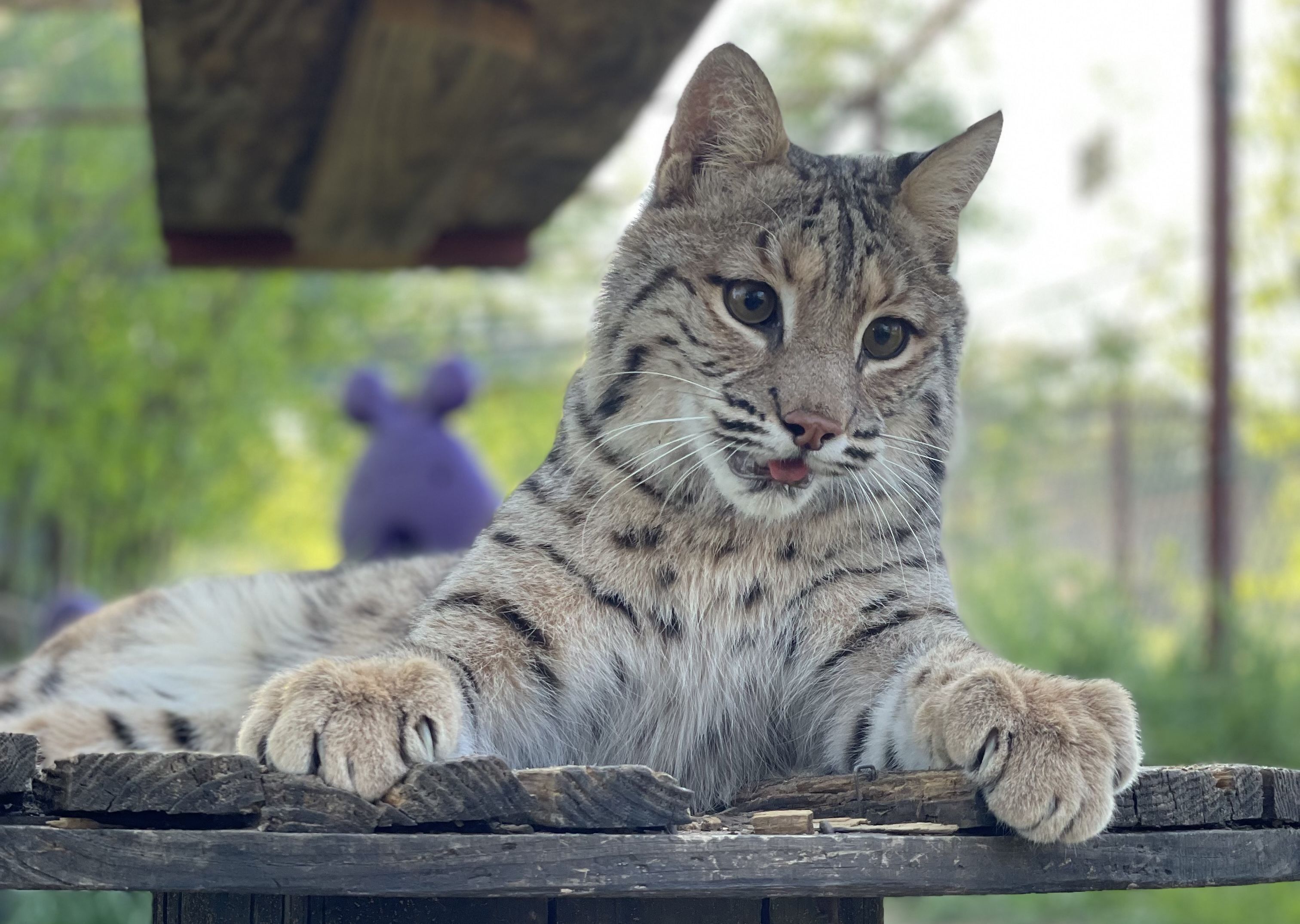
We are excited to announce that in the fall of 2021, we will be vaccinating our animals with the experimental COVID-19 vaccine uniquely made for animals and donated by the animal health company Zoetis.
Vaccinations should arrive at C.A.R.E. in late October. Each animal – including all lions, tigers, leopards, mountain lions, bobcats, lynx, serval, ring-tailed lemurs, and llamas -- will receive two doses, approximately three weeks apart, to provide protection from illness due to SARS-CoV-2. Experimental use of this COVID-19 vaccine from Zoetis is being authorized by the U.S. Department of Agriculture and our state veterinarian.
The animals that call C.A.R.E. home have come from various places, but once they find a safe haven here every precaution is taken to keep them as happy and healthy as possible for the rest of their lives. That includes protecting them from a virus that has been proven to infect both wild cat species and primates.
To ensure the animals’ safety as much as possible, we closed to the public for our weekend educational tours in March of 2020 and has been closed ever since. The result of this precaution has been the loss of thousands of dollars of donations a month. Once all the animals are vaccinated, there will be some hope of reopening on a limited basis so that both funding for the care of the animals and public awareness about the animals can increase.
“The past year and a half have been both emotionally and financially draining for us at C.A.R.E.,” said Founder and Executive Director Heidi Krahn. “While we have experienced a tremendous loss of donations, we made the decision to put our animals’ health and safety first – as we always do. We are so thankful to Zoetis for donating these vaccines that will enable us to hopefully reopen safely and to our wonderful donors who have stuck with us and made sure the animals had what they needed during this time.”
While the animals at C.A.R.E. will be vaccinated thanks to the generosity of Zoetis, there will still be extra precautions in place to protect our most at-risk animals, like 24 year-old black leopard Raven. Raven was recently named the oldest living leopard in captivity by Guinness World Records. At more than 10 years over the normal life expectancy of wild leopards, Raven is still in great health, but very fragile. The vaccine will help protect her from exposure to the coronavirus from her primary caretakers, but visitors will likely not be allowed to get within 10 feet of her enclosure to make sure she is safe.
ZOETIS VACCINE FAQs
How did Zoetis develop its COVID-19 vaccine for animals?
Zoetis initiated development activities for a new vaccine last year when the first dog was reported to be infected with COVID-19 in Hong Kong. Our initial development work and studies were completed on dogs and cats, and shared last year at the World One Health Congress.
In January, Zoetis donated its experimental vaccine for emergency use in the Great Ape population at the San Diego Zoo.
Is Zoetis’ COVID-19 vaccine for animals commercially available?
No. The zoos’ use of our vaccine is authorized for experimental use on a case by case basis by the United States Department of Agriculture (USDA) and the appropriate state veterinarians.
Zoetis is donating its experimental COVID-19 vaccine for animals to nearly 70 zoos, as well as more than a dozen conservatories, sanctuaries, academic institutions and government organizations located in 27 states in the U.S.
How does Zoetis’ COVID-19 vaccine for animals compare to human vaccines for COVID?
Zoetis’ experimental COVID-19 vaccine is uniquely formulated for animals. The virus – or antigen – is the same as in human vaccines; however, vaccines for animals vary based on the carrier – or adjuvant – that is used. The unique combination of antigen and carrier ensures safety and efficacy for the species in which a vaccine is used. Zoetis’ proprietary adjuvant has been demonstrated to be safe for many animal species.
What type of vaccine is Zoetis’ COVID-19 vaccine for animals?
Zoetis’ experimental COVID-19 vaccine is a subunit recombinant vaccine. It does not use a live or inactivated virus, nor does it use mRNA.
For reference: Dept. of Health & Human Services list of vaccine platform types: https://www.hhs.gov/immunization/basics/types/index.html
How many doses does Zoetis’ COVID-19 vaccine for animals require?
Zoetis’ experimental COVID-19 vaccine is meant to be administered in two doses several weeks apart.
What safety and/or efficacy data is available for Zoetis’ COVID-19 vaccine for animals?
Zoetis shared its initial safety and serology data for its new vaccine in a scientific poster at the World One Health Congress in the Fall of 2020. This is the only published study to date.
How is Zoetis monitoring the safety and efficacy of the zoos’ use of the experimental vaccine?
As part of the U.S. Department of Agriculture’s (USDA) 103.3 experimental use permit, the USDA requests use and safety data be reported back to them. Furthermore, Zoetis’ agreement with each zoo/organization requires them to provide a monthly update on usage and safety observations. In addition, any significant adverse events must be reported immediately to Zoetis on a form provided so that we may report to the USDA within three days.
Which zoos are receiving Zoetis’ donated COVID-19 vaccines for animals?
Zoetis is donating its COVID-19 vaccine for animals to nearly 70 zoos, as well as more than a dozen conservatories, sanctuaries, academic institutions and government organizations located in 27 states in the U.S.
Oakland Zoo in northern California is one of the first zoos to receive our donated doses and vaccinate its most at-risk animals. Additional zoos will receive their donated doses as legal approvals as well as USDA and state veterinarian approvals are completed in the coming weeks and months.
Zoetis is not sharing the list of zoos and organizations receiving our donated vaccine. Individual zoos and organizations may be willing to share their potential plans for vaccination.
Are all zoos and animal organizations receiving their vaccines at the same time?
No. Our vaccine is authorized for experimental use on a case by case basis by the United States Department of Agriculture (USDA) and the appropriate state veterinarians. Zoetis will ship the donated vaccine doses when each zoo and animal organization executes a material transfer agreement and completes the required regulatory processes in the coming weeks and months.
Will Zoetis donate its vaccine to zoos and animal organizations outside of the U.S.?
Zoetis continues to receive numerous requests for its experimental COVID-19 vaccine for animals and must adhere to regulations in each country. We continue to look at opportunities to help zoos and animal organizations outside of the U.S. protect their animals from COVID-19.
Which animals at zoos are being vaccinated?
Based on the information Zoetis has received from the zoos requesting our vaccine, we expect our experimental COVID-19 vaccine will be used to help protect the health and well-being of more than 100 mammalian species. The zoo veterinarians determine which animals they vaccinate based on their own risk assessments.





